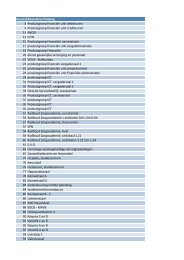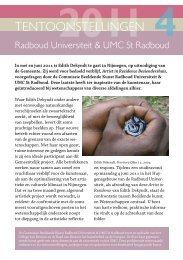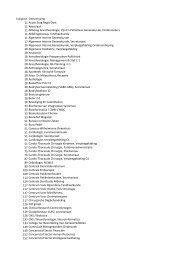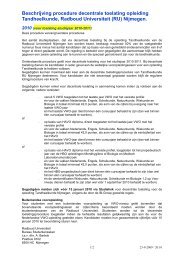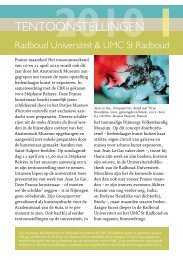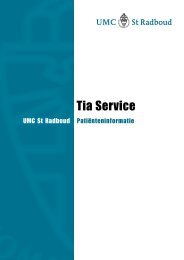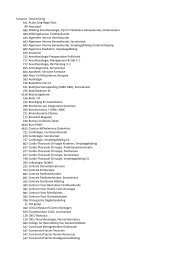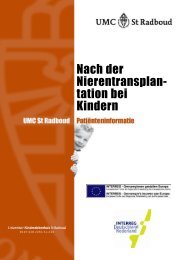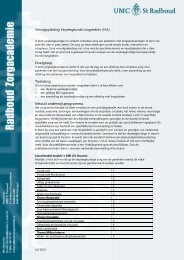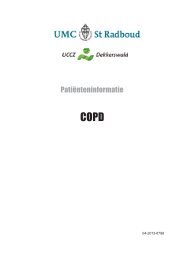Neuralgic Amyotrophy: idiopathic and hereditary ... - UMC St Radboud
Neuralgic Amyotrophy: idiopathic and hereditary ... - UMC St Radboud
Neuralgic Amyotrophy: idiopathic and hereditary ... - UMC St Radboud
You also want an ePaper? Increase the reach of your titles
YUMPU automatically turns print PDFs into web optimized ePapers that Google loves.
Over the past few years, more scientific insight has been gained into the genetic<br />
changes that can lead to HNA. Thus, it is now known that HNA can be caused by<br />
a mutation in several places in the DNA. The condition is, in medical terms, ‘genetically<br />
heterogeneous.’ It has, however, recently been indisputably established<br />
that one gene can lead to HNA attacks.<br />
This gene, or piece of <strong>hereditary</strong> material, is called SEPT9 <strong>and</strong> is located on the<br />
long arm of the 17th chromosome (17q25). In this gene, doubling or very small<br />
changes in the DNA material are found in families with HNA. It is, however, not yet<br />
clear precisely how this makes one more sensitive for neuritis. We do know that<br />
the typical features <strong>and</strong> other outward characteristics in some families appear to<br />
be caused by one very specific mutation in the SEPT9 gene, the so-called ‘R88W’<br />
mutation.<br />
Mutations in the SEPT9 gene are estimated to be present in approximately half<br />
of the HNA patients (or families). Alongside this, there are, therefore, also families<br />
who do not have these mutations, thus there must be more genes on other chromosomes<br />
that cause HNA when they undergo a mutation.<br />
Because a mutation in the SEPT9 gene only occurs in half (<strong>and</strong> in the Netherl<strong>and</strong>s,<br />
probably even fewer) of HNA patients, it is not yet worthwhile to test Dutch<br />
patients for this. After all, if no mutation is found, you still do not know for sure<br />
whether or not you have HNA. For the time being, the diagnosis is, therefore,<br />
primarily dependent upon whether or not there are other family members with<br />
NA. There are no other characteristics that can clearly differentiate between the<br />
<strong>hereditary</strong> <strong>and</strong> non-<strong>hereditary</strong> forms for the individual patient. Thus, in both forms,<br />
repeated attacks can occur <strong>and</strong>, in both forms, nerves other than those in the arm<br />
can also be affected.<br />
20<br />
Treatment<br />
It is clear that the treatment of NA is not easy. Over the past years, however, more<br />
information has become available on which treatment can be worthwhile. That<br />
treatment varies per each phase of the condition. We differentiate between three<br />
phases:<br />
1. Acute phase<br />
Painkillers<br />
The pain in the acute phase reacts best to a combination of two strong painkillers:<br />
a so-called long-acting NSAID <strong>and</strong> a long-acting opiate. These drugs must be prescribed<br />
by a physician. If your pain score is equal to or greater than 7 on a scale<br />
of 10, it is generally pointless to try only paracetamol or drugs such as ibuprofen<br />
or naproxen. Most NA patients say that these ordinary painkillers do nothing at all<br />
in the acute phase of an attack.<br />
Prednisone <strong>and</strong> other drugs that influence the immune system<br />
In the first days of an attack, a short therapy course using prednisone has a favourable<br />
effect with some NA patients. However, it does not work with everyone;<br />
prednisone provides around five out of ten people with fast pain reduction <strong>and</strong>, in<br />
one or two out of ten, with a somewhat faster recovery of strength than you would<br />
normally expect. It is, therefore, no miracle drug. Prednisone is a drug that must<br />
always be prescribed by a doctor. When prescribing it, one must always pay attention<br />
to the contraindications; those are the reasons why someone must not use<br />
the drug (such as poorly regulated diabetes, a stomach ulcer or depression).<br />
There are, as yet, still no data on a possible favourable effect of other drugs that<br />
influence the immune system in the case of NA. Therefore, the use of these drugs<br />
cannot be recommended.<br />
Advice for your doctor in the acute phase<br />
To combat pain during an NA attack or a relapse, a combination of long-acting<br />
morphine (for example, MS Contin 2 dd (twice daily) 10-20 mg) with a long-acting<br />
NSAID (for example, Diclofenac 2 dd 100 mg Retard) is advised. If there are no<br />
contraindications, a short course of prednisone per os can be considered. We use<br />
21



